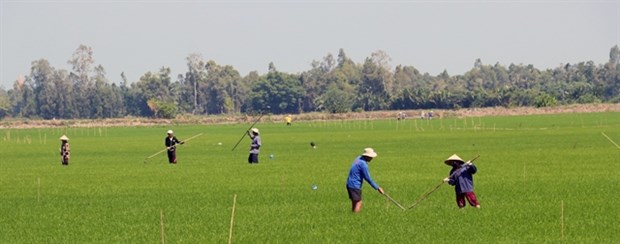Kien Giang to focus on 16 agricultural products
The Mekong Delta province of Kien Giang has identified 16 key products to focus on to increase the competitiveness of its agriculture.
 The 2019 – 20 winter – spring rice crop being planted in Kien Giang province’s Go Quao district with support from the Vietnam-Sustainable Agriculture Transformation programme. (Source: VNA)
The 2019 – 20 winter – spring rice crop being planted in Kien Giang province’s Go Quao district with support from the Vietnam-Sustainable Agriculture Transformation programme. (Source: VNA)Kien Giang (VNS/VNA) — The Mekong Delta province of Kien Giang has identified 16 key products to focus on to increase the competitiveness of its agriculture.
Its Department of Agriculture and Rural Development said they include rice, vegetables, mango, pineapple, sugarcane, high-value seafood, and livestock and poultry.
Do Minh Nhut, its deputy director, said: “The province develops key agricultural products in four sub-regions: the Long Xuyen Quadrangle, the western part of the Hau River, U Minh Thuong, and the sea and islands.”
It would zone crops, aquaculture and animal husbandry suitably in each sub-region and develop safe, sustainable and efficient production, he said.
To improve the yield, quality and value of key products, it has adopted advanced farming techniques and focused on environmental protection, he said.
It has more than 100,000ha of specialised farming areas with value chains in place for rice, vegetables, mango, pineapple, sugarcane, and some others since 2017.
The country’s largest rice producer has created 163 large-scaled rice fields with a total area of 47,680ha by pooling individual farmers’ holdings and involved 20 companies in it to guarantee demand for the participating farmers.
It has developed 300ha of shrimp farms that use advanced breeding technologies like semi-biofloc and biofloc and harvest 30-50 tonnes per hectare per crop.
It has also set up six two-stage industrial shrimp breeding sites for farmers to learn the model under which juvenile shrimp are bred in a nursery pond for a few weeks before being transferred to a main pond.
The pond beds are covered with plastic sheets and equipped with oxygenation facilities. Nets are hung above the water to protect the shrimp from sunlight and the inclement weather.
The model offers a yield of 26 tonnes, and wastewater is treated before being released into the environment.
The province has also developed models for breeding marine fish in floating cages based on Norwegian techniques off Phu Quoc Island.
Many areas it has zoned for farming rice, vegetables, pepper, and pineapple and breeding aquatic species meet good agricultural practices (GAP) standards./.













